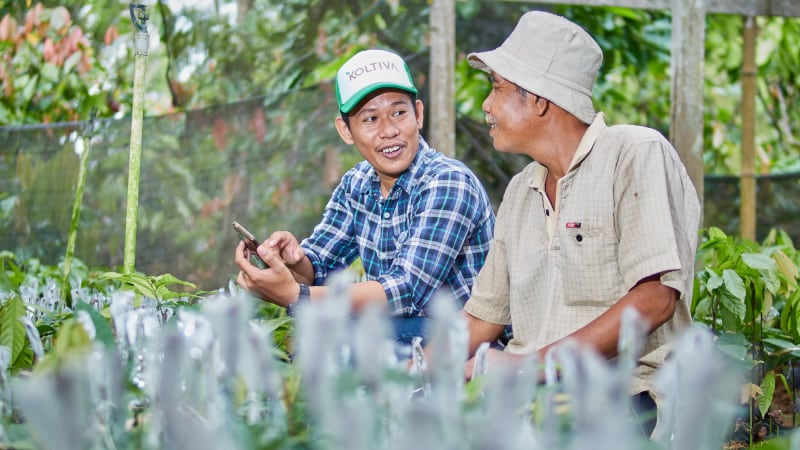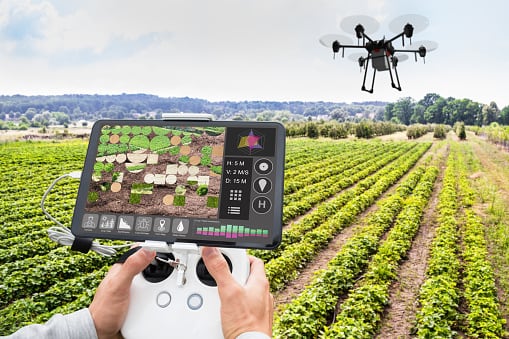During this period, investment activity mirrored that of the previous quarter, marking a departure from the peak activity observed in late 2022 and early 2023. Additionally, exit activity for the second quarter of 2023 remained in line with the preceding quarter, possibly signifying that the industry may have reached its lowest point.
The ag-tech industry’s notable surge in investments in Q2 was tempered by decreasing investment values, signalling a potential plateau in investment activity. Against the backdrop of a challenging funding environment exacerbated by elevated interest rates, investors continued to show interest in this sector, with significant deals such as insect grower Ynsect's US$175 million Series D round and farm management platform AIS' US$117 million late-stage venture capital (VC) round.
Despite initial concerns about market volatility, agtech's median pre-money valuation for 2023 stands at an impressive US$17 million, reflecting a substantial 33.1% year-on-year increase. This unexpected surge can be attributed to factors like a slow-down in deal activity and a renewed emphasis on quality over quantity.
General partners (GPs) are now dedicating more time to due diligence and investment evaluation, resulting in longer closing times for deals. The deals being completed tend to prioritise existing portfolio companies or those with lower risk and higher quality, reflecting investors’ discerning approach.
Exits and exceptions
Exit activity in the agtech sector has been on a decline over the past year, with this trend persisting into Q2 2023. According to the PitchBook report, only 13 exits were recorded during this period, with minimal investment value due to undisclosed merger and acquisition (M&A) activity. The initial public offering (IPO) market remained largely closed; however, two notable exceptions were observed in Q2.
Animal nutrition provider Ocean Harvest successfully registered an IPO, raising nearly US$7.5 million with its debut on the London Stock Exchange (LSE). Additionally, plant biotech company Cibus made its debut on Nasdaq through a reverse merger with Calyxt. These IPOs provide a glimmer of hope in an otherwise challenging exit landscape.
M&A opportunities within the agtech sector have been limited, primarily due to the prevailing high-interest rates. Nevertheless, there were notable acquisitions in Q2, including drone provider Dhaksha Unmanned Systems by Coromandel Technology for US$24.8 million and imagery analytics provider Plantix by Helm for an undisclosed amount. It is widely anticipated that exit activity will remain subdued until interest rates decrease and the IPO market reopens.
Climate resilience: A priority for ag-tech innovation
This aforementioned trends come in light of a recent report released by the Intergovernmental Panel on Climate Change, underscoring the profound influence of climate change on agricultural productivity. The report highlights climate change's adverse effects on crop production, animal health, fisheries and water availability, especially in the world's most vulnerable regions. Consequently, there are multi-faceted implications for ag-tech investments.
Foremost among these implications is the urgent need for ag-tech innovations geared toward bolstering climate resilience within agriculture. Such innovations encompass technologies that facilitate soil and water conservation, agroforestry, and the promotion of sustainable farming practices.
Furthermore, advancements in data analysis and predictive modelling will play an instrumental role in mitigating risks posed by escalating extreme weather events resulting from climate change. Importantly, these technologies should be accessible and affordable for small-scale food producers, allowing them to adapt to climate shifts while sustaining productivity.
Supporting this perspective, a recent survey of agricultural economists indicates a shift in the economic outlook for agriculture, both in the short and long term, due to the influence of weather extremes and fluctuations in commodity markets. Geopolitical risks, particularly concerning China and the Russian war in Ukraine, are unpredictable factors that could significantly affect the sector in the forthcoming year.
Consequently, agricultural technologies, including weather prediction tools, precision farming techniques and plant biotechnologies, will serve as critical instruments in adapting to changing climates while enhancing productivity and yields.
Within this context, it is noteworthy that farm management software saw its second-highest quarter of investment values ever recorded, with companies focused on farm optimisation and analytics emerging as top recipients of funding. Moreover, the aquaculture category likewise secured its second-highest quarter of investment values, driven by the pressing need for sustainable fisheries and food security.
Autonomous farm machinery retrofit: A bridge to precision agriculture
PitchBook’s report highlights the autonomous farm machinery sector, which is rapidly evolving within the agriculture industry. Leveraging advancements in artificial intelligence (AI), the Internet of Things (IoT), robotics and machine learning, this sector is dedicated to providing automated solutions for various farming operations. As the push toward precision agriculture gains momentum, so does the demand for autonomous farm machinery.
However, fully autonomous farm equipment remains limited in availability and its cost can be prohibitive for many farmers. This presents a significant market opportunity for companies offering navigation and autosteer retrofitting solutions.
Retrofitting existing machinery with autosteer and autonomous navigation systems presents a pragmatic solution to the high costs associated with fully autonomous equipment. These systems empower farmers to harness the benefits of automation, such as enhanced efficiency, reduced input costs and increased precision, without necessitating substantial capital investments.
Moreover, retrofitting offers a degree of flexibility, allowing systems to be transferred between different pieces of equipment. It also permits farmers to continue using familiar machinery, reducing the learning curve associated with entirely new equipment.
The market for autonomous farm machinery is poised for exponential growth, driven by increasing food demand, labour shortages and the push for sustainable farming practices. Nevertheless, the affordability of fully autonomous machinery remains a significant hurdle for many farmers. As a result, there is growing interest in retrofitting existing farm machinery with autonomous capabilities, rendering it a more accessible and economical option.
In this landscape, traditional agricultural equipment manufacturers, such as John Deere and CNH Industrial, are making progress with fully autonomous or semi-autonomous machinery. Concurrently, companies like FieldBee, Sabanto and Polymath Robotics have established themselves as providers of autosteer and navigation retrofitting solutions, enabling the upgrade of existing machinery with autonomous features.
Nevertheless, retrofitting autosteer and navigation systems is not without challenges. Farmers who lack technological expertise may face a steep learning curve. Additionally, while retrofitting is more cost-effective than purchasing new autonomous machinery, the upfront costs can still be burdensome. Retrofitting a tractor with autonomous capabilities, for instance, can range from US$43,000 to US$74,000, whereas acquiring an autonomous tractor may cost between US$50,000 and US$163,000.
These challenges, however, offer opportunities for companies in this sector. Businesses that provide comprehensive training, support services and affordable, user-friendly solutions are poised to gain a competitive advantage. Moreover, partnerships with financial institutions to offer financing options could make retrofitting more accessible to farmers.
As the agriculture industry continues its journey toward precision and sustainability, the demand for autonomous farm machinery is anticipated to surge. Retrofitting companies are uniquely positioned to bridge the affordability gap, providing farmers with practical means to adopt autonomous technology. As these companies continue to innovate and address challenges, the market potential in this space remains significant.
Bio-fertilisers: Paving the way for agricultural sustainability
Another area with significant potential for agricultural innovation that PitchBook’s report highlights is bio-fertilisers, which harness living micro-organisms to enhance soil nutrient profiles and have emerged as a pivotal innovation in modern agriculture.
Beneficial microorganisms, including Rhizobium bacteria, Mycorrhizal fungi and Phosphate-solubilizing bacteria, contribute to improved plant growth and soil fertility through nitrogen fixation, phosphorus solubilization and the synthesis of growth-promoting substances. These bio-fertilisers, as a sustainable alternative to conventional chemical fertilisers, are gaining prominence in the ag-tech landscape, with a slew of VC-backed start-ups leading the disruption.
The rising popularity of bio-fertilisers stems from their capacity to promote sustainability, enhance soil health and deliver long-term cost-effectiveness. Notably, the importance of the latter has grown amid the disruption of the synthetic fertiliser market due to the Russia-Ukraine war. Bio-fertilisers' low environmental impact aligns with global endeavours to embrace green solutions and implement greater restrictions on chemical fertilisers.
Consumer trends favouring organically and sustainably produced foods are further propelling demand for bio-fertilisers. Additionally, bio-fertilisers bolster climate change resilience by fortifying plant disease resistance, stress tolerance and soil health, thereby contributing to food security and increased crop productivity. The multi-faceted benefits of bio-fertilisers position them as a growing choice in contemporary agriculture.
The global bio-fertiliser market is poised for substantial growth, fuelled by increasing demand for organic products, growing environmental awareness and stricter regulations governing chemical inputs. VC firms have recognised this potential and are directing significant investments toward start-ups that are pioneering innovative bio-fertiliser solutions.
Several start-ups in the bio-fertiliser domain have garnered substantial VC support. For instance, Pivot Bio, with backing from prominent investors like Breakthrough Energy Ventures and Temasek Holdings, is developing bio-fertilisers featuring nitrogen-fixing microbes, offering a sustainable and reliable nitrogen source for crops and diminishing reliance on synthetic nitrogen fertilisers.
Kula Bio, supported by Collaborative Fund and The Engine, has devised a bacteria-based bio-fertiliser that can be applied using conventional methods and competes on cost with synthetic fertilisers. In a similar vein, Lucent Biosciences, funded by Prime Impact Fund, tackles soil degradation and nutrient run-off with its carbon-neutral, bio-available micronutrient fertilisers.
In parallel, Bionema, a prominent biological technology developer, is actively engaged in creating chemical-free crop protection solutions, including bio-fertilisers, bio-pesticides and bio-stimulants. Together, these VC-backed start-ups are reshaping the agricultural input landscape, leading the transition towards a more sustainable future in agriculture.
The disruption caused by bio-fertilisers in the traditional agricultural input market is evident in several ways, such as enhanced soil health, increased nutrient uptake and reduced environmental impact. Unlike chemical fertilisers that can deteriorate soil biological activity over time, bio-fertilisers improve soil fertility and bio-diversity. They also enhance nutrient solubility and availability, resulting in greater plant nutrient uptake. At the same time, bio-fertilisers are environmentally friendly, reducing the pollution associated with chemical fertilisers.
However, the bio-fertiliser industry faces challenges, including the limited replacement capacity for chemical fertilisers and potential variability in effectiveness based on soil conditions and crop types. Shelf life, odour and quality control issues also present challenges.
Additionally, farmers' limited access to high-quality bio-fertilisers, training on their usage, and regulatory, infrastructure and supply chain obstacles pose significant barriers. Overcoming these hurdles is pivotal for the industry to transform traditional agricultural practices.
The outlook for bio-fertilisers is promising. With the drive toward sustainable agricultural practices, the demand for bio-fertilisers is poised to surge. VC-backed start-ups, through their innovative approaches, are disrupting traditional chemical agricultural inputs, paving the way for a more sustainable future. The bio-fertiliser market offers an optimistic outlook, promising significant growth and a substantial impact on global agricultural practices.
Investor insight needed
The agtech sector's resilience is evident in the face of challenging economic conditions. The unexpected rise in median pre-money valuations, despite a decrease in investment activity, underscores the sector's attractiveness to investors.
However, the ongoing challenges posed by elevated interest rates and limited exit opportunities signal that the agtech investment landscape remains complex and uncertain, requiring investors to exercise caution and strategic thinking in the near future.




